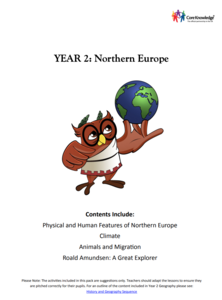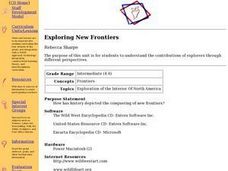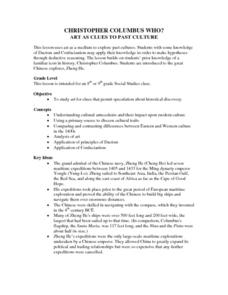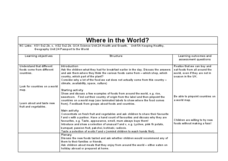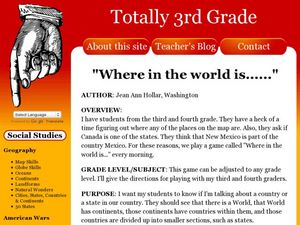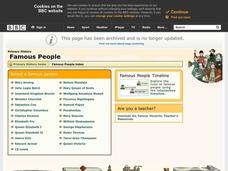Curated OER
Pre-Columbian Cultures in the Americas
Native American studies is fun, educational, and highly motivating. Fifth graders will gain a deeper understanding of the six major pre-Columbian culture areas on the North American continent. They will choose one group and conduct...
National Geographic
Ocean Exploration
Dora, Dora, Dora, Dora, Dora! This may be your little ones' best guess as to what it's like to be an explorer! Give them a deeper understanding with this compact examination. A four-minute video introduces them to Robert Ballard, the...
NOAA
Ocean Exploration
Sea explorers and scientists have found that because of temperatures being two to three degrees Celsius at the bottom of the ocean, most animals are lethargic in order to conserve energy. In this web quest, pairs of learners read about...
NOAA
Where Have All the Glaciers Gone?
What happens when ice melts? Well ... water happens. When that melting ice is a glacier, the amount of water that results produces change throughout the world. Middle school science sleuths uncover the truth about global warming, the...
NOAA
Off Base
How does carbon dioxide affect the world's oceans? The final installment in a series of six lessons has pupils research ocean acidification, then conduct an experiment to witness the delicate balance that exists in our seas. Materials...
Core Knowledge Foundation
Year 2: Northern Europe
How is life in Northern Europe different from other areas of the world? Historians journey through the various regions of Northern Europe discovering what type of climate, animals, and lifestyles exist in that section of the world. They...
Curated OER
Australian Aboriginal Art and Storytelling
Young explorers investigate Australian Aboriginal culture by listening to traditional Dreamtime stories and examining dot paintings created by Aboriginal artists. In addition, they locate the country on maps, discuss the geography of...
Ocean Explorer
Architects of the Coral Reef
Coral Reefs are the focus of a life science lesson plan. Upper graders look at how coral reefs are formed, how the animals and plants reproduce, and the variety of ways that humans benefit from coral reefs around the world. Groups of...
Curated OER
Ocean Exploration: Shapes and Patterns Under the Sea
So many shapes in our vast oceans. Young explorers can discover new shapes in a variety of ways in this lesson. One way is having free exploration with a pattern shape kit handed out by the teacher. Another is by viewing a video, Ocean...
Curated OER
How Does Your Garden Grow? Discovering How Weather Patterns Affect Natural Cycles
For the warm-up in this cool climate lesson, you will need to click on "Mapping" and then "US Mapping" once you arrive at NOAA's "US Climate at a Glance" page. Earth science explorers realize that 2012 was a warm winter for us. They read...
Curated OER
How Much is it Worth?
Money makes everything a little more fun for your mathematicians! Show them how they can implement their addition skills in the real world using this worksheet. Scholars examine six sets of coins, which are photographed. They include...
Curated OER
I'll Trade a Ponce de Leon for a Columbus...
Third graders research the discovery of the Americas by various explorers. They create a multiedia presentation about an explorer of their choice including their motivations, obstacles, and successes. Their explorer information will be...
Curated OER
Route Reconstruction
Students trace sailing route of Spanish and Portuguese exploration ships. They calculate and compare distances that different explorers traveled. Students calculate how long it would take to travel an explorer's route using different...
Curated OER
Exploring New Frontiers
Students gather information about the contributions of various explorers. Using the internet, they discover the many viewpoints of those who conquered new frontiers. They examine and compare life 200 years ago to their life today.
Curated OER
Charting the Discovery of the Americas
Students create chart using Microsoft Word depicting how trade led to the exploration of different regions of the world.
Curated OER
Christopher Columbus Who?
Learners recreate a "60-minutes" interview using cue cards and historical information on the Chinese explorer Zheng He. This instructional activity is an excellent introduction to World History during the 1400's.
Curated OER
Of Maps and Worldviews
Students explore Ptolemy's world map as an expression of the Renaissance view of the world.
Curated OER
Be a Food Explorer
Young scholars discover the origins of fruits and vegetables. In this nutrition lesson, students research how fruits and vegetables came to the United States via trade routes. Resources are provided.
Curated OER
Where in the World
Students explore the global grid system. In this globe lesson, students identify latitude and longitude lines and how these can tell the coordinates of any place. They use the Internet to find the exact coordinates for their town.
Curated OER
Where in the World is...?
Students work in groups to locate an appropriate planet where inhabitants of a fictional place can be relocated. They create a PowerPoint presentation to introduce their relocation site, as well as ecosystem information about the site....
Curated OER
Christopher Columbus
Students read about the good and bad aspects of Christopher Columbus in Jean Fritz's book, "Where do you think you're going, Christopher Columbus?" They conduct and analyze a survey about common myths and create a pop-up book.
Curated OER
Christopher Columbus
Youngsters who are just beginning to learn about the age of exploration do a study of Christopher Columbus. They each select four pictures from the voyage of 1492 and write a caption below each one stating what is happening. The class...
Curated OER
Exploration Resume Project
Seventh graders take on the role of a European explorer and create a resume, or personal data sheet, listing his achievements in reverse chronological order. They draw and label a map and list what the explorer did to add to Europe's...
Curated OER
Explorers Stopped in Russia
Students read an article about an explorer attempting to walk around the world. They complete vocabulary exercises and take a quiz. They identify several examples of homographs in English and complete a worksheet.







